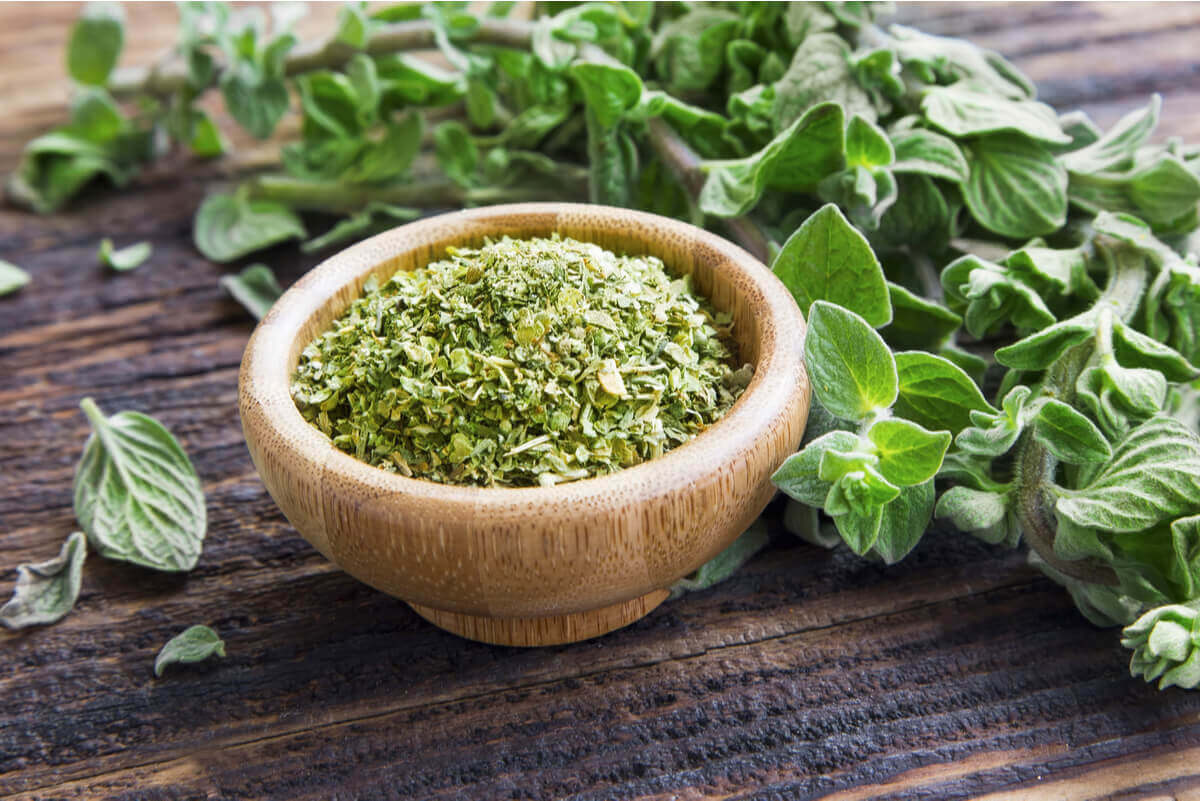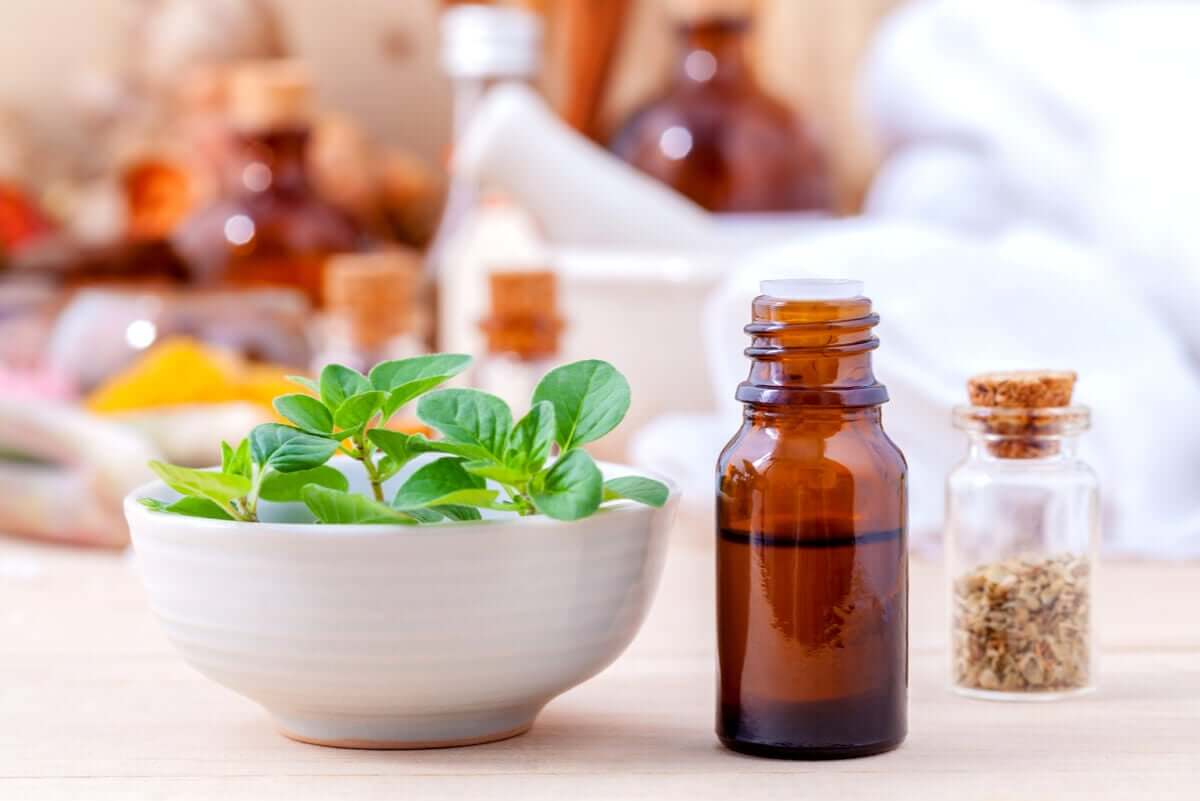Oregano Essential Oil for Cold Relief

Oregano is an aromatic plant that belongs to the mint family. Oregano essential oil is popular thanks to its antiviral, antioxidant, and anti-inflammatory properties. Traditionally, many people use this oil for respiratory health and to treat colds and flu.
The oil is obtained from various parts of the plant and is consumed in different presentations. Most of these are found in health food stores as supplements, dye, or aromatic essential oil. The latter is for external use and aromatherapy.
Discover how to use it, as well as the benefits and contraindications of oregano oil to treat the symptoms of cold and flu.
The benefits of oregano essential oil
Oregano contains several compounds with properties that are beneficial to human health, such as rosmarinic acid, thymol, and carvacrol. This composition is the basis that provides positive effects, among which are the following.

1. It’s antibiotic
According to an ongoing study, oregano can fight bacteria such as Staphylococcus aureus, one of the most common causes of food poisoning and skin infections. Also, the oil may help fight some antibiotic-resistant bacteria.
2. It helps with cholesterol reduction
Oregano essential oil may lower cholesterol, according to a scientific study. Those who received the treatment increased their good cholesterol level, while bad cholesterol was reduced compared to those who only practiced diet advice.
3. It’s an antioxidant
A study with other similar herbs showed that oregano contains 3 to 30 times higher levels of antioxidants when compared to thyme, St. John’s wort, and marjoram. The antioxidant content of oregano oil is higher than that of some fruits and vegetables.
4. It improves intestinal health
Oregano can improve intestinal symptoms caused by parasites, such as swelling, pain, and diarrhea.
According to one study, all participants experienced a reduction in the presence of invasive organisms and a high percentage were cured. Also, it could be useful against the condition known as leaky gut.
5. It has anti-inflammatory properties
A study in progress reveals that the oregano essential oil can reduce inflammation thanks to one of its components, carvacrol. Despite advances, more human research is needed.
6. It may treat fungal infections
Studies have shown that oil of oregano is effective against five different types of Candida, a fungus that affects the mouth and intimate area. It’s considered even more effective than other proven oils. Candida is found in the form of yeast and causes infections when it grows too much.
7. It helps relieve pain
An ongoing study found that oregano essential oil had similar effects to commonly used painkillers such as morphine. This property is due to one of its substances called carvacrol, however, human studies are still needed to prove its full effectiveness.
8. It may help with weight loss.
According to research, oregano oil may help with weight loss because carvacrol could reverse the chain of events that form fat cells. However, there’s still no conclusive evidence in humans.
Discover: 6 Essential Oils to Combat Sinusitis
How to use oil of oregano to treat a cold
Thanks to the properties of oregano oil, it can help fight bacteria, relieve congestion in the airways, and also serves as an anti-inflammatory. In the case of colds, the two most common ways to use it are inhalation and gargling.
Steam inhalation with oil of oregano
- Place a pot of water on the fire and let it boil. Then, remove the pot from the fire, add two to three drops of oregano oil and cover the pot.
- Have a towel ready in advance to cover your shoulders, back, head, and, finally, the pot. This way, you’ll be able to maintain the heat of the pot longer.
- Once you have steps 1 and 2 ready, place the still covered pot on a table just under your nose.
- Make sure you’re warm enough and carefully uncover the pot. Breathe the steam through your nose for about 6 to 12 minutes. This will help release the mucus in your nostrils.
- Avoid drafts and cold temperatures during and after the decongestant mist.
For cases of a sore throat
- In a glass of warm water, pour one to two drops of oregano oil.
- Now, with small sips, gargle for about half a minute.
- Repeat until you have finished the water. This will help you to reduce the inflammation.
How to use it to treat bronchitis and a cough
Another of the properties of oil of oregano is its potential as an expectorant. It dilutes the mucus, relieving the symptoms of bronchitis. There are two ways to treat it.
How to do a steam inhalation
- Put a pot of water on the fire, when it reaches boiling point, lower it from the fire, add two to three drops of oregano oil and cover the pot.
- While the water boils, prepare a towel to cover your back, shoulders, and head. Also, have a towel for the pot. This way you will be able to keep the heat of the pot longer.
- On a stool or table, place the still covered pot right under your nose.
- Carefully uncover the pot and breathe in the steam for about 6 to 12 minutes. This will help loosen mucus.
- Avoid drafts during and after inhalation.
How to apply the oil of oregano to the chest
- Mix in a small bowl 1 to 2 teaspoons of coconut oil with 5 to 8 drops of oregano oil and stir for a few seconds.
- With warm hands, smear the mixed oil on the fingertips and rub it gently on the chest.
- You must stay warm during and after the treatment.

Contraindications of oil of oregano
Be careful not to take an excessive dose of oil of oregano. You need to know that it’s elaborated with a high concentration. If you take too much or use it for a long enough period of time, this thymol content could produce adverse effects.
Among the most common side effects are skin and eye allergies, nausea and vomiting, dyspepsia, and skin rashes. There is still a lack of scientific research to support its use in pregnant women and children, so it’s best to avoid this oil in both cases.
Read also: How to make and use lavender oil
Use oregano oil for colds carefully
The benefits of oil of oregano are beneficial. It even has antioxidants in higher amounts than some fruits and vegetables. However, remember that more extensive studies are still needed to fully understand its function.
Oregano oil can be used to relieve some common health problems (colds and flu), but you must take or apply the proper doses. Read the manufacturer’s recommendations for more information.
All cited sources were thoroughly reviewed by our team to ensure their quality, reliability, currency, and validity. The bibliography of this article was considered reliable and of academic or scientific accuracy.
- Preuss, H. G., Echard, B., Dadgar, A., Talpur, N., Manohar, V., Enig, M., Bagchi, D., & Ingram, C. (2005). Effects of Essential Oils and Monolaurin on Staphylococcus aureus: In Vitro and In Vivo Studies. Toxicology mechanisms and methods, 15(4), 279–285. doi: 10.1080/15376520590968833
- Sienkiewicz, M., Wasiela, M., & Głowacka, A. (2012). Aktywność przeciwbakteryjna olejku oreganowego (Origanum heracleoticum L.) wobec szczepów klinicznych Escherichia coli i Pseudomonas aeruginosa [The antibacterial activity of oregano essential oil (Origanum heracleoticum L.) against clinical strains of Escherichia coli and Pseudomonas aeruginosa]. Medycyna doswiadczalna i mikrobiologia, 64(4), 297–307.
- Ozdemir, B., Ekbul, A., Topal, N. B., Sarandöl, E., Sağ, S., Başer, K. H., Cordan, J., Güllülü, S., Tuncel, E., Baran, I., & Aydinlar, A. (2008). Effects of Origanum onites on endothelial function and serum biochemical markers in hyperlipidaemic patients. The Journal of international medical research, 36(6), 1326–1334. doi: 10.1177/147323000803600621
- Zheng, W., & Wang, S. Y. (2001). Antioxidant activity and phenolic compounds in selected herbs. Journal of agricultural and food chemistry, 49(11), 5165–5170. doi: 10.1021/jf010697n
- Force, M., Sparks, W. S., & Ronzio, R. A. (2000). Inhibition of enteric parasites by emulsified oil of oregano in vivo. Phytotherapy research : PTR, 14(3), 213–214. doi: 10.1002/(sici)1099-1573(200005)14:3<213::aid-ptr583>3.0.co;2-u
- Zou, Y., Xiang, Q., Wang, J., Peng, J., & Wei, H. (2016). Oregano Essential Oil Improves Intestinal Morphology and Expression of Tight Junction Proteins Associated with Modulation of Selected Intestinal Bacteria and Immune Status in a Pig Model. BioMed research international, 2016, 5436738. doi: 10.1155/2016/5436738
- Silva, F. V., Guimarães, A. G., Silva, E. R., Sousa-Neto, B. P., Machado, F. D., Quintans-Júnior, L. J., Arcanjo, D. D., Oliveira, F. A., & Oliveira, R. C. (2012). Anti-inflammatory and anti-ulcer activities of carvacrol, a monoterpene present in the essential oil of oregano. Journal of medicinal food, 15(11), 984–991. doi: 10.1089/jmf.2012.0102
- Pozzatti, P., Scheid, L. A., Spader, T. B., Atayde, M. L., Santurio, J. M., & Alves, S. H. (2008). In vitro activity of essential oils extracted from plants used as spices against fluconazole-resistant and fluconazole-susceptible Candida spp. Canadian journal of microbiology, 54(11), 950–956. doi: 10.1139/w08-097
- Aydın, S., Öztürk, Y., Beis, R. and Hüsnü Can Başer, K. (1996), Investigation of Origanum onites, Sideritis congesta and Satureja cuneifolia Essential Oils for Analgesic Activity. Phytother. Res., 10: 342-344. doi: 10.1002/(SICI)1099-1573(199606)10:4<342::AID-PTR832>3.0.CO;2-W
- Jung, C. Y., Kim, S. Y., & Lee, C. (2018). Carvacrol Targets AXL to Inhibit Cell Proliferation and Migration in Non-small Cell Lung Cancer Cells. Anticancer research, 38(1), 279–286. doi: 10.21873/anticanres.12219
- Cho, S., Choi, Y., Park, S., & Park, T. (2012). Carvacrol prevents diet-induced obesity by modulating gene expressions involved in adipogenesis and inflammation in mice fed with high-fat diet. The Journal of nutritional biochemistry, 23(2), 192–201. doi: 10.1016/j.jnutbio.2010.11.016
This text is provided for informational purposes only and does not replace consultation with a professional. If in doubt, consult your specialist.








